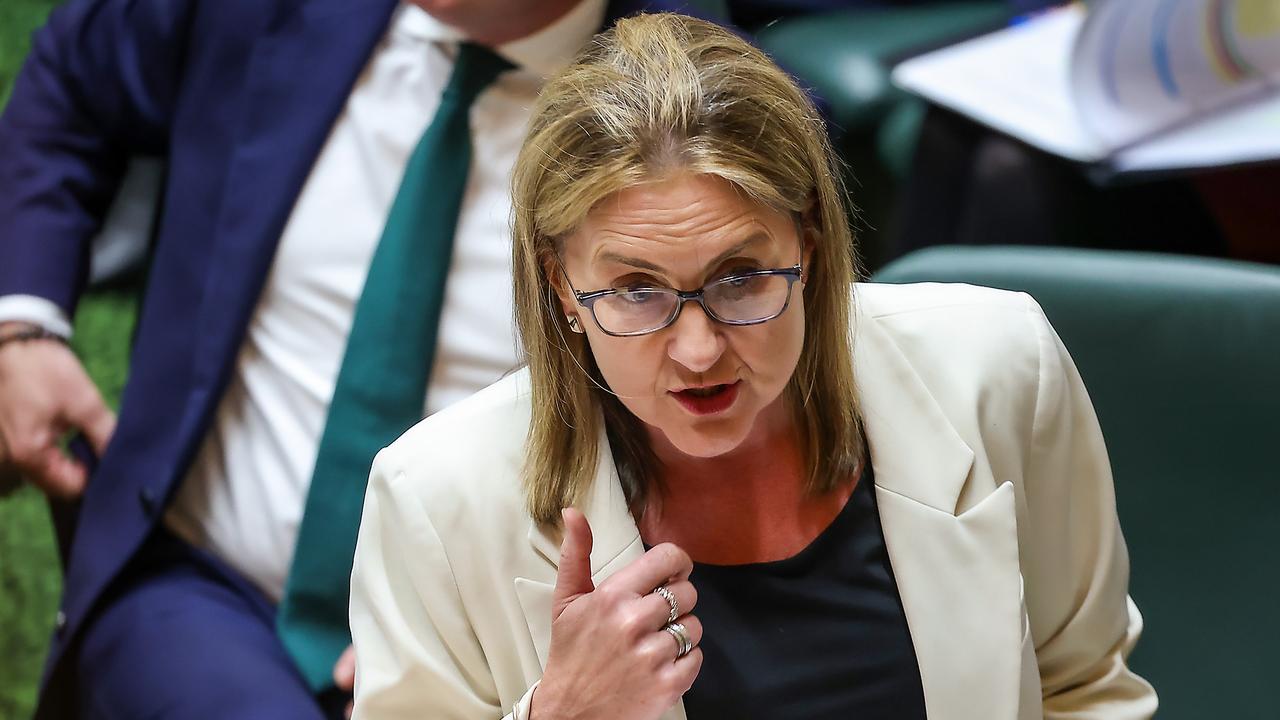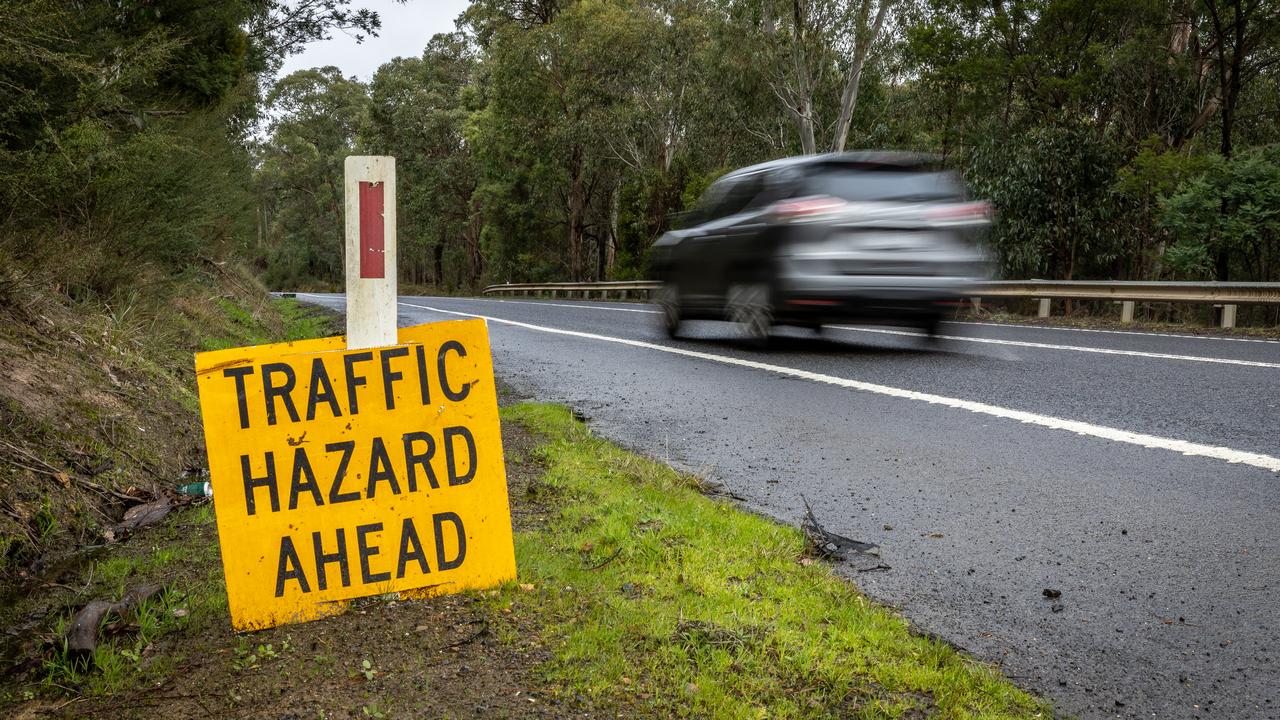Five new COVID cases in Victoria, PM says mass vaccinations on agenda
Victoria recorded five new coronavirus cases in hotel quarantine as the state government called for an “urgent recalibration of our vaccine program”.

Victoria
Don't miss out on the headlines from Victoria. Followed categories will be added to My News.
There were five new COVID-19 cases recorded in Victoria’s hotel quarantine system overnight.
And there is growing concern over the vaccine rollout, with Acting Premier James Merlino calling for an “urgent recalibration” of the program.
The five new cases on Thursday were all in hotel quarantine.
It brought Victoria’s total active cases in hotel quarantine to eight and marked the biggest number of new cases in a single day, since international flights into Victoria resumed.

It also the biggest jump since five cases were recorded on February 12 — but all of those cases were locally transmitted, just days before the state went into a snap lockdown.
More than 17,000 test results were received and 3,565 vaccines were administered by state services.
The state has gone nearly seven weeks since its last case of community transmission was detected.
But several suburbs in Melbourne’s east are on high alert after virus fragments were detected in the Ringwood area on Tuesday.
The suburbs affected include Bayswater, Bayswater North, Boronia, Croydon, Croydon North, Croydon South, Heathmont, Kilsyth, Kilsyth South, Montrose, Ringwood, Ringwood East, Sassafras, The Basin, Tremont and Wantirna.
Anyone who visited the affected suburbs between April 6 and 9, and is suffering any symptoms of COVID-19, is urged to get tested.
The health department said the viral fragments may be present in the sewage because of an active infection in the community, or because of continued viral shedding after an infection.
‘WELL PREPARED’ FOR POSITIVE CASES
The agency running hotel quarantine says it is “well-prepared” to handle positive cases as Victoria records its biggest spike in quarantine cases since the program resumed.
A COVID-19 Quarantine Victoria spokeswoman said the five travellers have been transferred to a health hotel under “strict infection prevention and control measures”.
“The cases include a man in his 20s, a woman in her 20s, an airline crew member in her 20s and two children,” she said.
“CQV has strict IPC processes and procedures, daily staff testing and workers are N95 mask fit-test and trained and well prepared to manage positive cases.”
CQV did not comment when asked which countries the travellers had returned from.
DELAY ON VACCINE REDIRECTION
The Andrews Government says it is still awaiting a response from the federal government about redirecting its vaccine supply to GPs two days after the proposal was floated.
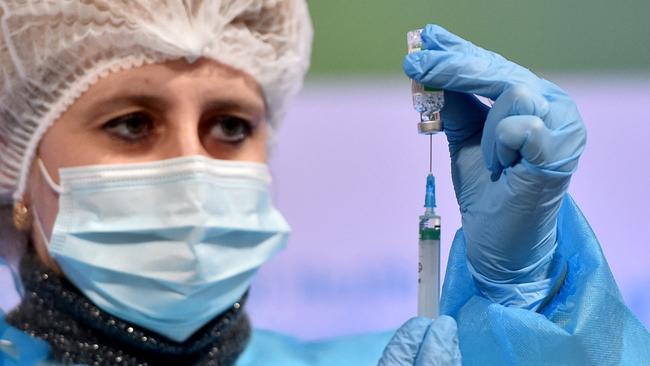
Acting Premier James Merlino wrote to the Prime Minister earlier this week requesting the state’s AstraZeneca shipments for vaccination hubs planned for the next two weeks go to clinics to assist the rollout.
This would be equal to about 80,000 doses.
The state has paused administering the vaccine to under 50s while it awaits more detail on indemnity for healthcare professionals and multilingual information about the AstraZeneca doses.
Speaking on Thursday, Mr Merlino said he was still waiting for a response to vaccine proposal but welcomed twice-weekly national cabinet meetings to help fix the rollout.
“Those are the things we’ll be urgently raising with the federal government,” he said.
Mr Merlino said the government was open to taking on responsibility for more vaccines and for mass vaccination clinics but this would depend on supply from the Commonwealth.
“We need an urgent recalibration of our vaccine program,” he said.
“Time is absolutely of the essence. Now is not the time to slow down.
“We need to get on with it.
“Public confidence has taken a hit. The numbers have taken a hit and that’s why we need to recalibrate and get on with vaccinating our population.
PM: MASS VACCINATIONS ON AGENDA
Scott Morrison has flagged “mass vaccination options” for Australians aged under 50, saying it may be possible that people in that age group could be immunised by the end of the year.
The Prime Minister said the rollout “has to change because of events” linked to the rare blood clots associated with the AstraZeneca vaccine in under 50s.
“That will mean we’ll need to change our rollout to go to mass vaccination options and that will have to be done in partnership with the states and territories,” Mr Morrison told The West Live podcast.
“If we can do all that, then there is the possibility that can be achieved by the end of 2021 but at this stage there are too many uncertainties I think to commit to a timetable like that, I would need and states would need to be sure they could put those arrangements in place and ramp them up and to do that safely with the population to achieve that.”
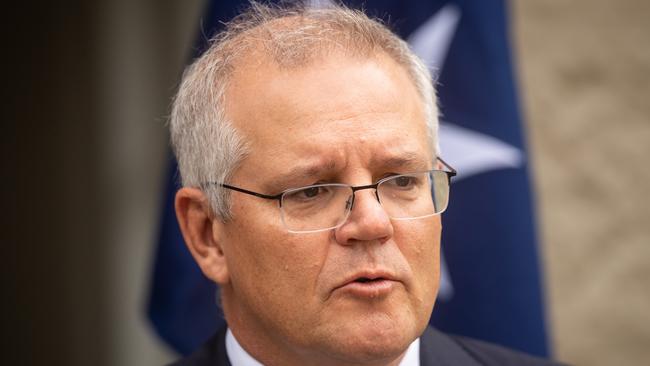
Mr Morrison downplayed concerns surrounding the AstraZeneca vaccine, saying there was a “remote risk” associated with the jab, but acknowledged the pause will “change how we do the rollout”.
During a press conference on Wednesday, the Prime Minister said, “the critical thing right now is we must be vaccinating those most vulnerable in our community.”
He continued, ”I want to stress, particularly those Australians aged over 70, AstraZeneca is a safe and approved vaccine for people aged over 50. The risk to elderly Australians and vulnerable Australians of COVID is great if there is an outbreak.”
NOVAVAX SHORTAGES ANNOUNCED
Novavax has announced supply shortages have forced it to push back its production target of 150 million COVID-19 vaccine doses per month.
The delay serves another blow to the federal government’s vaccine rollout program, with Australia ordering 51 millions doses of Novavax.
The order was due to arrive in “mid-2021” but that’s now up in the air.
“We said during our earnings call that we expect all capacity to be online by around mid-year. We’re continuing to refine that timing as we get closer, which now leads us to think we’re online/at full capacity by Q3,” Novavax communications director Amy Speak told the ABC.
“There are some supply shortages that come and go that have contributed to the revision in timing. These have included things like the bioreactor bags and filters.”
Novavax is expected to get the green light from the UK’s medical regulator as early as this month after releasing positive UK test data. It will be manufactured locally in the UK but Australia will need to import the vaccine.
QLD LIFTS RESTRICTIONS
Masks will no longer be mandatory, dancing will return, and visits will resume to aged care and disability homes, hospitals and prisons when weeks of tight restrictions in Queensland come to an end on Thursday.
Premier Annastacia Palaszczuk made the welcome announcement today, more than two weeks after the state was plunged into a snap three-day lockdown to curb the spread of COVID-19 after two separate clusters emerged from the Princess Alexandra Hospital.
At least 19 cases have been linked to the two clusters, which spread after a doctor and nurse at the hospital became infected while treating a returned traveller.
Ms Palaszczuk thanked Queenslanders for their “mighty job”.
“It has not been easy … But by doing that we’ve kept everyone safe,” she said.
“I won’t say there won’t be future cases where we have to wear masks, I don’t know the future, but we are easing restrictions.
“(And) Dr Young said there are no issues with easing restrictions from 6am (instead of 12pm).”
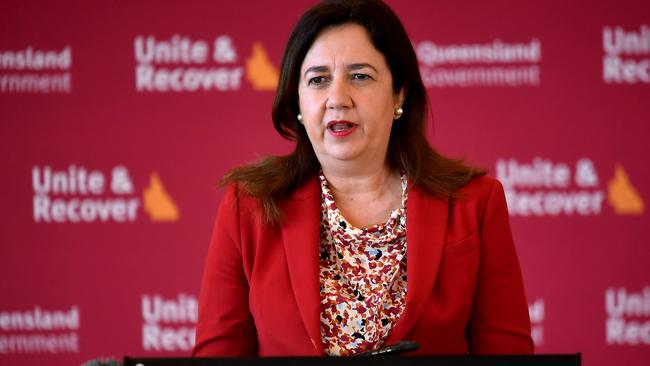
What will change from 6am Thursday:
- Masks will no longer be mandatory indoors except at airports, but Queenslanders will be encouraged to carry one and wear it on public transport or where social distancing is not possible
- Standing will be allowed at pubs and clubs while eating and drinking
- Visitors at private residences will increase to 100
- Visitors will be permitted at aged care and disability care homes, hospitals and correctional facilities
- Dancing at nightclubs and indoor venues will be permitted
- Weddings and funerals will be allowed to host 200 guests
- Outdoors there will be no restrictions on gatherings
- Ticketed venues and open-air stadiums will be able to return to 100 per cent capacity
PM TAKES DRASTIC ACTION OVER VACCINE ROLLOUT
The Prime Minister has demanded the country’s leaders and health authorities ramp back up to a war footing, admitting the failing COVID-19 vaccine program faces “serious challenges”.
The country’s jabs rollout has fallen well short of initial expectations, compounded further by blood clotting concerns with the AstraZeneca shot.
Scott Morrison will call on national cabinet to recommence regular meetings from Monday in a bid to “get the program back on track”.
Last week, it was announced the AstraZeneca jab won’t be offered to Australians under the age of 50 following advice from the Australian Technical Advisory Group on Immunisation.
This led to Mr Morrison refusing to commit to a timeline for the rollout to be completed after previously ensuring the nation all jabs would be provided by October.
“There are serious challenges we need to overcome caused by patchy international vaccine supplies, changing medical advice and a global environment of need caused by millions of COVID-19 cases and deaths,” he said on Tuesday.
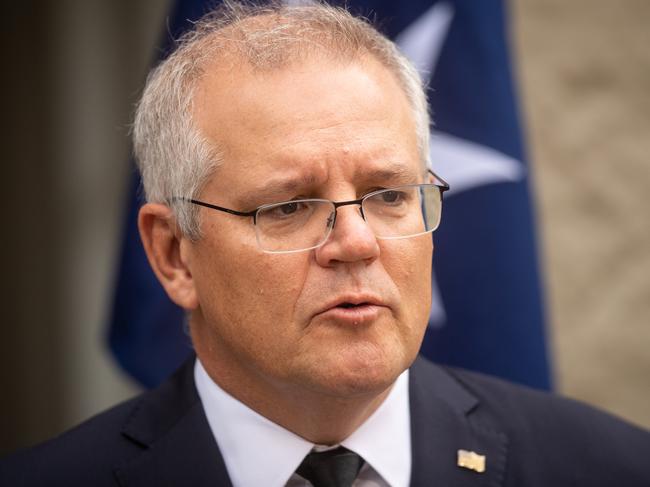
“This is a complex task and there are problems with the program that we need to solve to ensure more Australians can be vaccinated safely and more quickly.”
The state and territory leaders will return to biweekly meetings “until we solve the problems”.
“There are issues we are trying to deal with as a federal government and I have been upfront about those,” Mr Morrison said.
“But among the states and territories, they are also tackling their own unique issues and working together we are all going to be in a better position to find the best solutions.
“We are throwing everything at these issues, uniting the nation to keep the vaccination program safe, to get the rollout right and to be open and transparent about how we are tracking.”
The urgent request from the Prime Minister comes after weeks of ongoing hostility over the vaccination program, with federal members accusing state counterparts of stockpiling vaccines.
BLOOD CLOT WOMAN LEAVES INTENSIVE CARE
A West Australian woman that suffered a blood clot after taking the AstraZeneca vaccine is out of intensive care.
The woman in her 40s was taken to the emergency department of a regional hospital about two weeks after receiving the jab in March.
She was flown to the Royal Darwin Hospital where she was admitted into intensive care.
She is now in a stable condition.
“Her family has authorised us to say that her progress has been very positive and that she is recovering well,” WA Health Minister Roger Cook told reporters on Tuesday.
A 44-year-old Melbourne man also developed the condition following his AstraZeneca vaccination last month.
Therapeutic Goods Administration deputy secretary Professor John Skerritt said the cases were rare.
“We have a second case of this syndrome that we call thrombosis clotting, a short and low level of platelets that is unusual,” Prof Skerritt said.
“That means that two from 700,000, one in 350,000.
“Your chances of winning Lotto a much higher.”
MELBOURNE SUBURBS ON ALERT
Melbourne residents have been put on alert after COVID-19 fragments were detected in wastewater, affecting some 16 suburbs.
“Coronavirus fragments have been detected in wastewater from the Ringwood area,” the Victorian Department of Health said in a statement just before 6pm on Tuesday.
The east Melbourne suburbs affected include Bayswater, Bayswater North, Boronia, Croydon, Croydon North, Croydon South, Heathmont, Kilsyth, Kilsyth South, Montrose, Ringwood, Ringwood East, Sassafras, The Basin, Tremont and Wantirna.
“Weak detection of viral fragments in a wastewater sample collected on 8 April has been confirmed by further laboratory testing,” a statement from the health department said.
Fore more see the Herald Sun.
NEW RULES FOR PFIZER STORAGE
Australia’s drug regulator has given Pfizer vaccines the green light to be stored at freezer temperatures.
The development will make storage and distribution of the COVID-19 jabs more flexible, with Australia doubling its order to 40 million doses.
Previously, Pfizer’s world-first messenger ribonucleic acid (mRNA) vaccine needed to be kept at -70C.
This was achieved using “sophisticated eskies” containing dry ice that lasts for 14 days.
But Therapeutic Goods Administration deputy secretary Professor John Skerritt said it had approved for the Pfizer vaccine to be stored for up to two weeks in normal freezer temperatures.
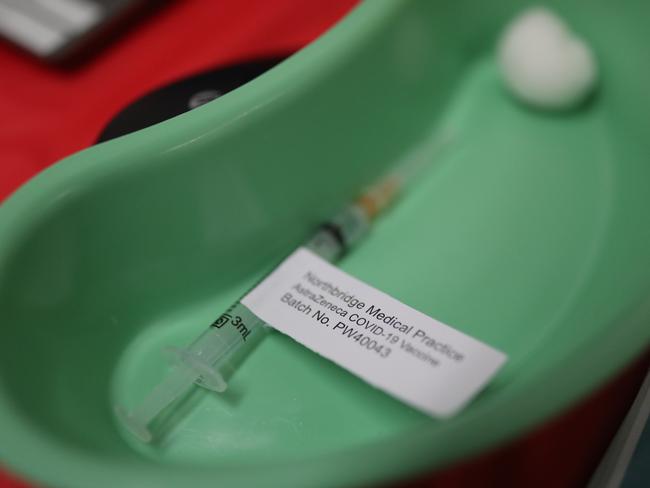
“It doesn’t mean you can spend its whole time in Australia, it still requires that ultra cold storage,” Prof Skerritt said.
“But it does mean a shipment could be made from Sydney to Broken Hill, or other places like that, at normal freezer temperatures.
“We also approved shorter periods of time but acceptable periods of time at refrigerator temperatures.
“The good news is we have more flexibility than we thought we had in how it can be stored and transported.”
MAN DIES FROM COVID IN QLD
An 80-year-old man who tested positive for COVID-19 on day five of hotel quarantine in Queensland was transferred to the Prince Charles Hospital on March 25 for treatment but died this month.
“Each life lost is a reminder of the global challenge,” Health Minister Greg Hunt said.
The man’s case of the deadly virus was detected after he arrived in Australia from the Philippines, having transmitted through Papua New Guinea.
“The 80-year-old returned traveller died in hospital, after contracting coronavirus overseas. He was diagnosed while in hotel quarantine and admitted to hospital on 25 March,” Queensland Premier Annastacia Palaszczuk said.
Queensland’s chief health officer, Dr Jeannette Young, said the man spent time in ICU but had been in reduced care when he died.
Dr Young also the man’s death caused no issue to the state’s plans to ease restrictions.
“There is no risk to anyone in the community from this case,” Dr Young said.
WHY AUSTRALIA WON’T GET JOHNSON & JOHNSON VACCINE
Australia will miss out on the Johnson & Johnson one-dose vaccine, the Federal Government has confirmed.
A spokesman for Health Minister Greg Hunt said the federal government had decided against pursuing the vaccine because it is based on similar technology to the AstraZeneca vaccine.
“The (Johnson & Johnson) vaccine is an adenovirus vaccine, the same type of vaccine as the AstraZeneca vaccine,” they said in a statement.
The European drug regulator revealed it is reviewing rare blood clots suffered by recipients of the Johnson & Johnson vaccine in the United States.
The European Medicines Agency (EMA) said it was investigating four serious cases but it was unclear at this stage if the clots were related to the vaccine or another medical issue.
Three of the cases occurred during the US rollout where nearly five million had been given the vaccine by Thursday, while one was during a clinical trial.
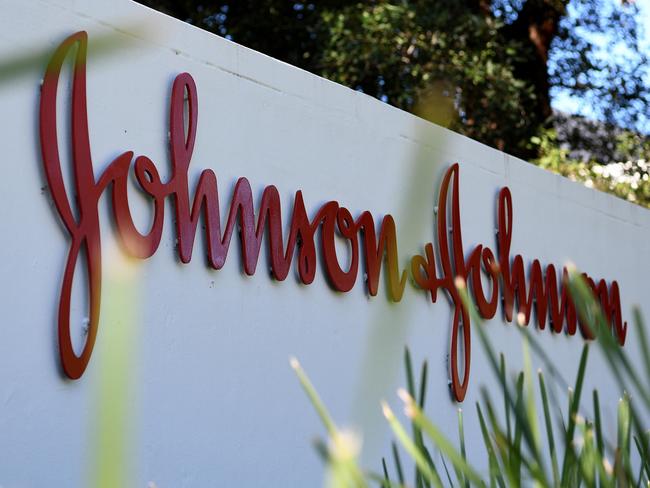
In one of the cases, the person died from the complication.
Johnson & Johnson said it was aware of the review and was working with regulators to assess the issue, but insisted “no clear causal relationship has been established between these rare events and the Janssen COVID-19 vaccine”.
The major pharmaceutical’s jab is currently only available in the US and was scheduled to be issued in the European Union in coming weeks.
The complication comes amid concerns with the AstraZeneca shot, which is threatening to derail confidence in the vaccine rollout.
Epidemiologist at the University of New South Wales, Professor Mary-Louise McLaws, insisted the extremely rare complications in each of the vaccines far outweighed the threat of COVID-19.
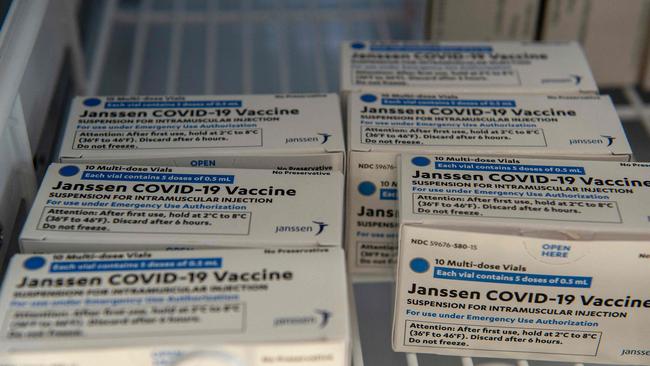
“It's all about putting into proportion the risk of death to our elderly group who represent 100 per cent of all coronavirus deaths in Australia,” she told NCA NewsWire.
“They only die if they get COVID, so to keep them from getting infected we have to ring-fence them.
“In the context of a pandemic, there’s this enormous risk of this older group dying so you want to protect them by vaccinating everybody, but particularly the young ones who have a greater risk of acquiring it and transmitting it.”
Despite Australia not yet committing to the Johnson and Johnson vaccine, the hiccup from the EMA this week threatens to complicate an already increasing supply issue across the globe.
‘I WON’T GIVE A NUMBER OR DATE’
Chief medical officer Paul Kelly says he can’t say how many Pfizer doses will arrive per week and whether there are enough doses to give to frontline workers under the age of 50.
Dr Kelly refused to put a time frame on when Australians would get their first dose.
“With this new information we have over the last few days, we need to recalibrate what we are doing with the program,” he told reporters.
“I won’t give a number or date. But we are absolutely committed to providing the vaccine to anyone, any adult Australian, who wants the vaccine – as quickly as possible.”
It comes after Prime Minister Scott Morrison axed setting any vaccine target as it is impossible to know whether every Australian will receive a vaccine shot before the end of the year.
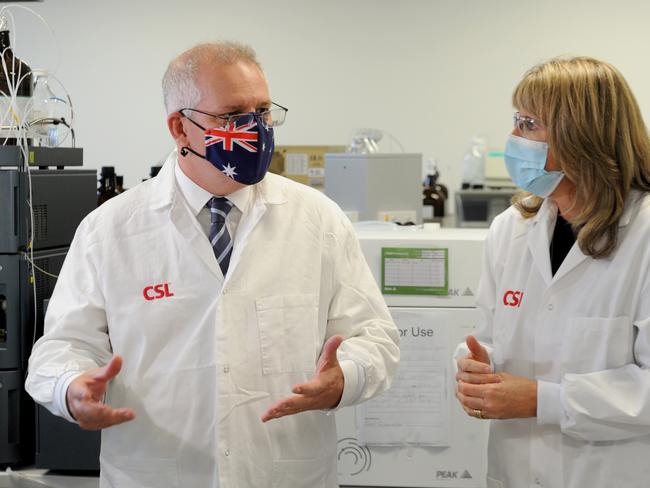
Mr Morrison said there were too many uncertainties involved in the rollout to set new targets.
“The government has also not set, nor has any plans to set, any new targets for completing first doses,” he said on Facebook.
“While we would like to see these doses completed before the end of the year, it is not possible to set such targets given the many uncertainties involved.
“We will just get on with the job of working together to produce, distribute and administer the vaccines as safely and efficiently as possible.”
The government has distributed updated consent forms and consumer information on the vaccine after ATAGI recommended the AstraZeneca vaccine should not be given to under 50s.
The federal government has secured an extra 20 million Pfizer vaccines to overcome rollout delays.
Health Minister Greg Hunt said GPs were joining the rollout, with 4000 on board.
He said the federal government had vaccine indemnity agreements in place that protected doctors from legal exposure in the event of a claim of medical negligence, as many were holding off giving the jab without confirmation of this.
“The AMA and college of general practitioners have clear advice in writing from the government to that effect and they also have updated informed consent material,” he said.
“I am saying this on behalf of the government but also on behalf of our legal advice: no doctor need worry.”
In letters to the AMA and the Royal Australian College of General Practitioners seen by The Australian, Mr Hunt said the federal government would reimburse medical indemnity insurers for 50 per cent of eligible claims above $500,000 in relation to the administration of vaccines.
AUSSIES WANT JAB BUT PM’S HANDLING DIVIDES
A majority of Australians still want to get the coronavirus vaccine despite recent concerns over the AstraZeneca vaccine, but opinion is divided on Prime Minister Scott Morrison’s handling of the coronavirus pandemic.
According to a Ray Morgan snap poll, the number of Australians who say they will receive a COVID-19 jab has increased with 69 per cent of Australians willing to be vaccinated, seven per cent had already received a jab and seven per cent were willing to be vaccinated once the Pfizer dose becomes available – totalling 83 per cent and three points higher than in February.
The snap SMS poll conducted on April 9 and 10 also revealed support for vaccines was split depending on political allegiance.
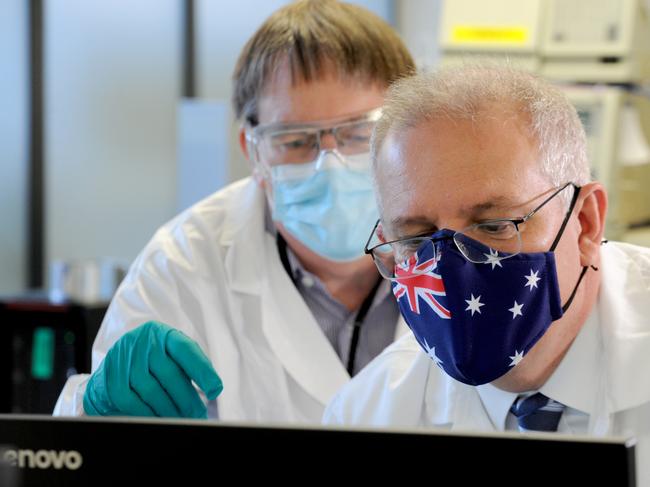
Only 13 per cent of Liberal votes said they would refuse a jab, increasing to more than one-in-five Labor and Green voters.
The nation is split on Mr Morrison’s handling of all COVID-19 related issues with 51 per cent disapproving of Mr Morrison’s handling of the pandemic and 49 per cent approving.
Victoria is the state most unhappy with the Federal Government’s handling of the pandemic, with 62 per cent of residents disapproving while 54 per cent of NSW residents were happy with Mr Morrison’s performance.
“Despite the slower than expected rollout of COVID-19 vaccines the increasing support for being vaccinated is a positive sign that vaccine coverage will reach a large majority of the population when the vaccine rollout is completed – which may not be until early 2022 and current rates,” Roy Morgan CEO Michele Levin said.
FEARS OVER NZ TRAVEL BUBBLE
Excitement at the opening of Australia’s travel bubble with New Zealand has been tempered by fears that failure could do more damage to fragile consumer confidence.
The Australian Federation of Travel Agents has called for a slower return to international travel to allow the vaccination rollout to reach a point where consumers could book with confidence, The Australian reports.
AFTA chairman Tom Manwaring said the bubble could do more harm than good.
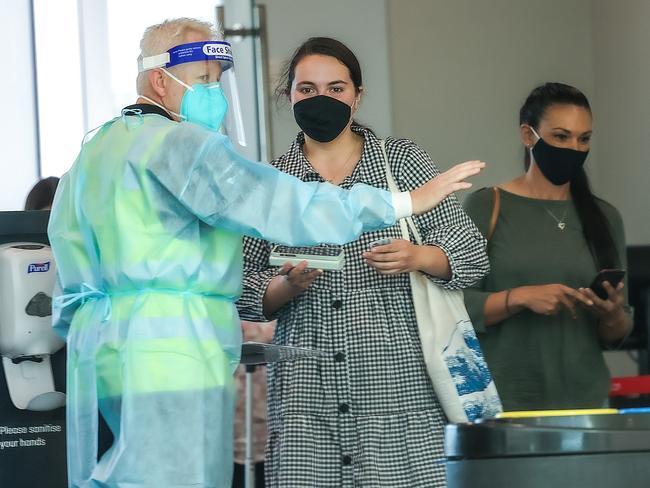
“We say that reluctantly but in the travel industry there is a lot of trepidation that if there are some more COVID cases in Auckland as a result of those flights from India, that will result in a shutdown,” Mr Manwaring said.
“That would be another blow to the travel industry, on top of the damage that’s occurred over the last 14 months.”
Mr Manwaring said there was a “fear factor” that travel could be interrupted.
“New Zealand’s Prime Minister said ‘be prepared for disruption’. You can’t plan an
international holiday and talk about disruption. People can’t plan their lives like that,” he said.
Read related topics:COVID-19 Vaccine

